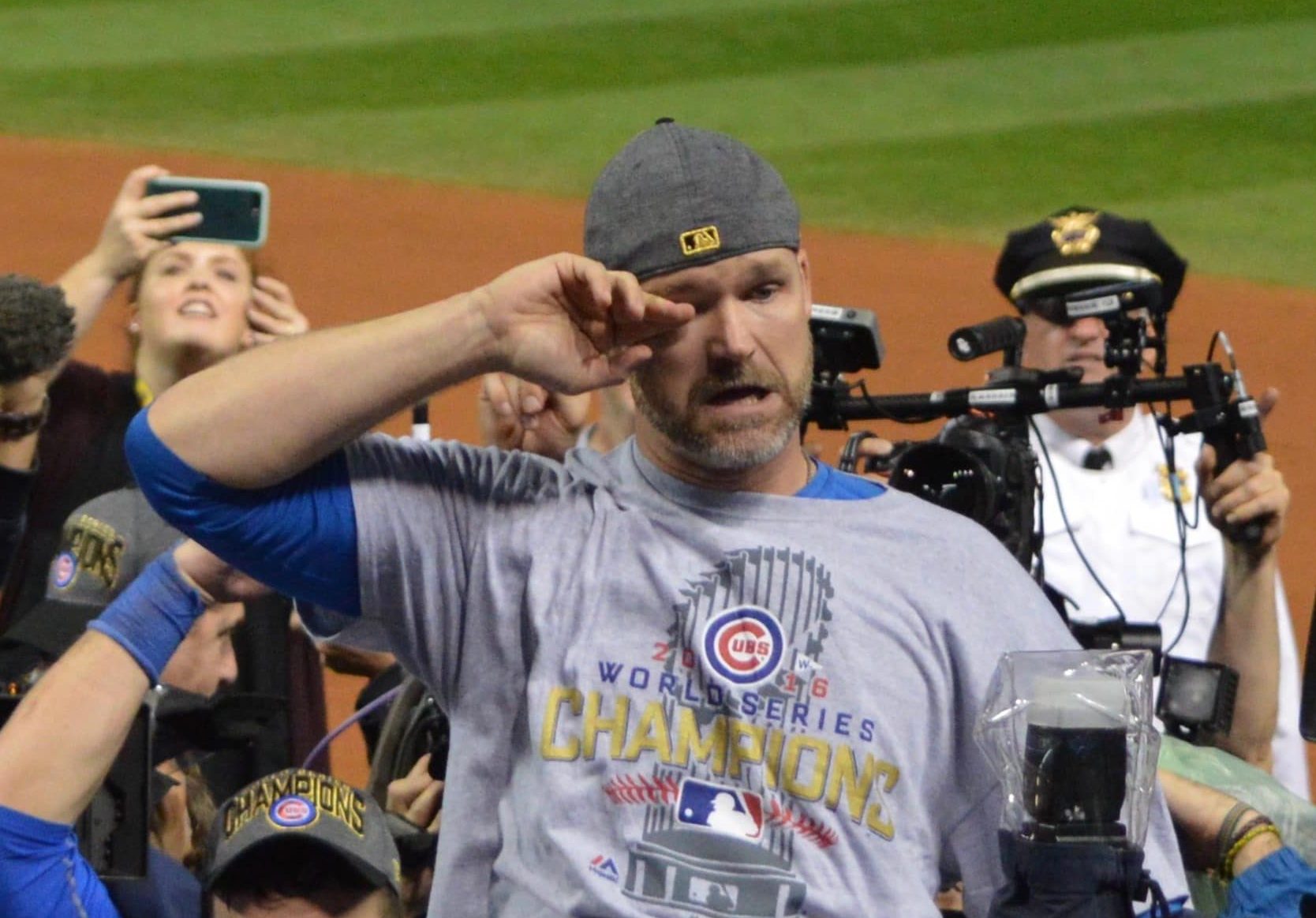
Cubs Getting ‘Fat and Happy’ Stalled Competitive Window, Player Development
Have you ever fallen prey to highway hypnosis and completely missed your exit or turn or whatever? It may even be a route you’ve taken before and are intimately familiar with, but you blow right past it and keep on driving just the same. You’ve even got other people in the car with you who are wondering where the hell you’re going, yet they remain silent because they trust you and assume it’s all part of a plan they’re not privy to.
If that’s ever happened to you, perhaps you can take solace in knowing the Cubs may feel the same way. Multiple sources told NBC Sports Chicago’s David Kaplan that the organization has suffered from a lack of attention to detail since winning the World Series, with one source from within the organization even telling Kap the Cubs “got fat and happy and that cannot be allowed to continue.” While we’ve heard tacit admissions of such complacence already, this is a bit more frank than any of the statements made without anonymity.
Or is it? A bedraggled Theo Epstein said after the 2018 season that the team lacked edge and urgency, then ignited a blaze of takes when he called 2019 a “season of reckoning.” By repeatedly stressing accountability, the Cubs were telling us they’d lacked it in the past. Nowhere was that more obvious than in player-driven initiatives that included cutting back on booze and junk food, focusing on trap games, having lineups made out further in advance, and mandating more BP sessions.
Gee, it’s almost as though the players were unhappy with the lack of direction from above and decided to take matters into their own hands. None spoke publicly on the matter, but Sahadev Sharma and Patrick Mooney reported that the changes came out of their suggestions during tense exit interviews that preceded Epstein’s postmortem press conference. And though no one has openly criticized Joe Maddon since his departure, it’s clear the changes David Ross will usher in are being welcomed.
“I think the biggest change from Joe to David will be…I know Joe was super relaxed, very laid back, kinda let the players set their own way,” Kyle Schwarber told 670 The Score’s Julie and Maggie Show from Cubs Convention on Saturday. “I think David’s gonna come in and he’s got it on his mind what he wants to do and I think things are gonna be a little more structured. He’s gonna demand a higher amount of respect.
“Not that Joe didn’t, but I think there’s gonna be a little more structure in everything we’re going to be doing on a day-to-day basis.”
Schwarber’s sentiments mirror those of former bench coach Mark Loretta, who told 670 The Score the Cubs needed to make adjustments to their practice habits and game planning. That’s kind of a self-own coming from the man whose role was to run some of those things, but it was more an indictment of Maddon. Among other things, the lax approach to prep and execution is a big part of the reason Ken Rosenthal wrote that the Cubs “waited one year too long” to move on from Maddon.
That’s where we get to the front office, which may have applied the same loyalty they’ve shown their draft picks to a manager who was just two years removed from leading the Cubs to the mountaintop. Though some saw a parting of ways as fait accompli even as far back as their 2018 collapse, Epstein wanted to give his manager a chance to finish out his contract with a bang under new parameters not of his own devising.
Whether it was an overactive sense of allegiance or something more practical — like not wanting to pay two managers or just doubting that another manger would be better — retaining Maddon now looks like a misstep. And while every reader can undoubtedly come up with a list of trades and free agent signings they’d like to do over, the thrust of this whole thing is to look at changes the Cubs waited too long to make.
Some of their underwhelming moves may have come as a function of having the budgetary rug pulled out from under them. Without granting Epstein and Jed Hoyer full amnesty here, it does seem as though some of their decisions were made with a mistaken understanding of how much payroll flexibility they’d have in the future. You could also say they spent without regard for subsequent payrolls, which can’t be dismissed, but let’s put the truth at somewhere in between.
The team’s finances are far from an open book, so most of what we’ve got on that front is conjecture. Their launch of Marquee Sports Network was delayed by restrictive language in their sale agreement that prolonged old broadcast agreements, though one wonders if the inability or lack of desire to buy those out cost valuable time in properly staging what should be a massive money-maker. Even without full knowledge of all the details, ownership and business operations shoulders the blame on this front.
A much more obvious and damning aspect of this whole thing for baseball operations is the failure to be more proactive in updating a development system that had fallen behind the times. After going several years without promoting an impact homegrown pitcher or a position player from outside the first round, it was revealed during the 2019 Cubs Convention that they’d undertaken a philosophical shift to adopt a more aggressive approach.
Those changes were followed by a more drastic restructuring of the entire pitching and hitting development infrastructure, including both personnel and technology. We don’t know as much about the specifics of what Justin Stone will be doing as director of hitting, but the Down on the Farm session at CubsCon gave us some insight into alterations on the pitching side.
“With the pitching, we’ve always had offseason programming, whether it’s strength and conditioning, nutrition, or throwing programs,” senior director of development Matt Dorey explained. “But we really have overhauled that. We’ve taken a look at each individual pitcher and really bucketed them by what we feel like they need to prioritize with their development and built out an individual throwing program based off of that assessment.
“Those assessments come from our scouting reports, from R&D evaluations, and the feedback’s been great. Craig Breslow, director of pitching, is really the mastermind behind this program…we started throwing programs earlier, [they’re] more individualized.”
Taken absent context, this is all very exciting stuff. I mean, the idea of identifying each pitcher’s unique needs and tailoring bespoke throwing programs to meet them does seem like a great way to maximize development. Trouble is, this also seems like a very obvious step for an organization that was once thought to be on the cutting edge of baseball technology. Are the Cubs really coming to this realization in the Year of Our Lord 2020?
It appears that way, though it’s hardly surprising when you consider how complacency seems to have permeated the organization from the top down. Returning to the analogy from earlier, it’s like the Cubs missed their exit and are now touting the directions they’re using to reach their destination from a new starting point. Meanwhile, legions of backseat drivers are rolling their eyes.
This has all just been a really wordy way of explaining that the Cubs’ issues aren’t the product of oversight by any one person or department. Instead, unquestioned faith in the practices that led them to the World Series prevented them from making necessary critical assessments until they’d gone several miles down the road. Now they’re left staring at two wasted seasons, potentially a third the way things are going this winter, of a young core that was supposed to have gotten even better after 2016.
And make no mistake, that last part is largely on the players themselves. As much as the coaches, trainers, and other team personnel are tasked with helping players hone their bodies and skills, all the knowledge in the world matters little if it’s not being properly translated to the field. In that regard, the Cubs fell short of expectations because they simply weren’t performance on a consistent basis.
At the same time, a farm system that was supposed to supplement the big club and offset increased spending on pitching and arbitration-eligible hitters has been stuck in neutral. That trend has begun to change and may be on the verge of really blowing up in a good way, but the fact remains that development was allowed to languish for far too long.
Now that we’re feeling all down in the dumps, maybe even a little angry, I’ll close by saying that the Cubs do seem to have course-corrected on the development side. Whether and how that can adequately refresh an MLB roster that may be forced to trade a former Rookie of the Year and MVP due to a lack of financial flexibility remains to be seen, but things look a lot brighter than they did a couple years ago. And who knows, maybe getting under the competitive balance tax threshold this season means they’ll be able to open up the checkbook for 2021.
There are a lot of different ways this thing can go, so let’s just hope whoever’s driving the car isn’t using Michael Scott’s GPS.

